

Learning Styles and Differentiated Instruction. References: (1) Kirschner, P. (2017).
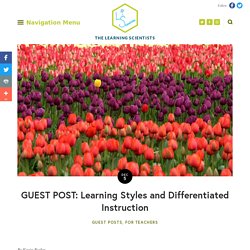
Stop propagating the learning styles myth. Computers and Education, 106, 166-171. (2) Macdonald, K., Germine, L., Anderson, A., Christodoulou, J., and McGrath, L. (2017). Dispelling the myth: Training in education or neuroscience decreases but does not eliminate beliefs in neuromyths. . (3) Willingham, D., Hughes, E., and Dobolyi, D. (2015) . (4) Arter, J., and Jenkins, J. (1979) . (5) Kavale, K., and Forness, S. (1987) . (6) Husmann, P., and O’Loughlin, V. (2018) . (7) Pashler, H., McDaniel, M., Rohrer, D., and Bjork, R. (2008). Weinstein et al (2018), Teaching the Science of Learning.
Love To Teach – Research and Resources for every classroom. Researchers debunk myth of 'right-brained' and 'left-brained' personality traits. Chances are, you've heard the label of being a "right-brained" or "left-brained" thinker.
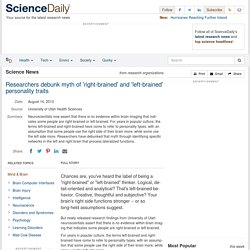
Logical, detail-oriented and analytical? That's left-brained behavior. Creative, thoughtful and subjective? Your brain's right side functions stronger -- or so long-held assumptions suggest. How curiosity changes the brain to enhance learning. The more curious we are about a topic, the easier it is to learn information about that topic.
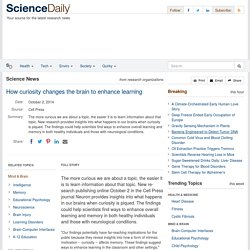
New research publishing online October 2 in the Cell Press journal Neuron provides insights into what happens in our brains when curiosity is piqued. The findings could help scientists find ways to enhance overall learning and memory in both healthy individuals and those with neurological conditions. Ask the Cognitive Scientist: How Can Educators Teach Critical Thinking? By Daniel T.
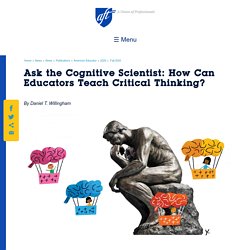
Willingham How does the mind work—and especially how does it learn? Teachers’ instructional decisions are based on a mix of theories learned in teacher education, trial and error, craft knowledge, and gut instinct. Such knowledge often serves us well, but is there anything sturdier to rely on? Cognitive science is an interdisciplinary field of researchers from psychology, neuroscience, linguistics, philosophy, computer science, and anthropology who seek to understand the mind.
Welcome! – Retrieval Practice. Repetition and Learning. There are many misconceptions about effective learning and studying.
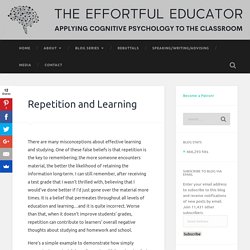
One of these false beliefs is that repetition is the key to remembering; the more someone encounters material, the better the likelihood of retaining the information long-term. I can still remember, after receiving a test grade that I wasn’t thrilled with, believing that I would’ve done better if I’d just gone over the material more times. It is a belief that permeates throughout all levels of education and learning…and it is quite incorrect. The Tiger Teachers and cognitive science. Cognitive science is a key plank in the Tiger Teachers’ model of knowledge.
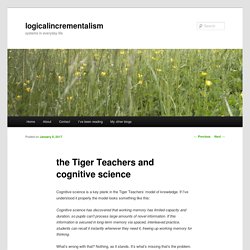
If I’ve understood it properly the model looks something like this: Cognitive science has discovered that working memory has limited capacity and duration, so pupils can’t process large amounts of novel information. EEF Blog: What does research say about the application of cognitive science approaches in the classroom? The EEF is commissioning a systematic review of the evidence about the application of cognitive science in the classroom.
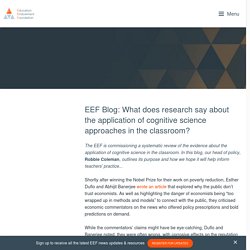
In this blog, our head of policy, Robbie Coleman, outlines its purpose and how we hope it will help inform teachers' practice... Shortly after winning the Nobel Prize for their work on poverty reduction, Esther Duflo and Abhijit Banerjee wrote an article that explored why the public don’t trust economists. Recommended Educational Research Papers for Teachers to Read on Mr Barton Maths. Arrow_back Back to Teachers Recommended Educational Research Papers for Teachers to Read My interest in educational research only really began when I spoke to the likes of Dylan Wiliam, Daisy Christodoulou, Doug Lemov, Robert and Elizabeth Bjork, Kris Boulton, Will Emney, Mark McCourt, Bruno Reddy, Greg Ashman and Tom Bennett for my Mr Barton Maths Podcast.
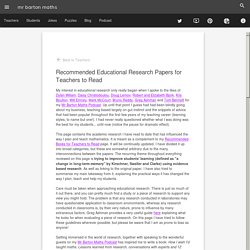
Up until that point I guess had had been blindly going about my business, teaching based largely on gut instinct and the snippets of advice that had been popular throughout the first few years of my teaching career (learning styles, to name but one!). I had never really questioned whether what I was doing was the best for my students... until now (notice the pause for dramatic effect). The Best Way to Help Children Remember Things? Not “Memorable Experiences” - Excerpt from The ResearchEd Guide to Education Myths.
Students are highly unlikely to gain understanding of scientific concepts unless the experiments are conducted after these concepts have already been taught.
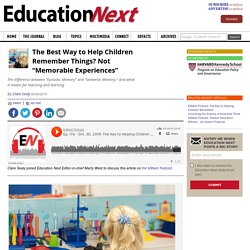
When we look back on our own school days, our strongest memories are probably a mix of big occasions—field trips, plays, and sports days alongside more personal events tinged with strong emotion. Things that happened that were really funny or sad, or that made us feel excited, interested, exhilarated, or angry. The Best Way to Help Children Remember Things? Not “Memorable Experiences” - Excerpt from The ResearchEd Guide to Education Myths. How effective is multiple choice quizzing? A) Very Effective B) Effective C) Ineffective.
‘testing can have an intrinsic effect on the memory of studied material’Charles B Kromann, Morten L Jensen and Charlotte Ringsted, 2008 The effects of testing for long term retention and transfer have been the focus of much research in recent years, with conclusive findings that testing has positive impacts on learning and subsequent recommendations that it should not be seen simply as a means of assessment.
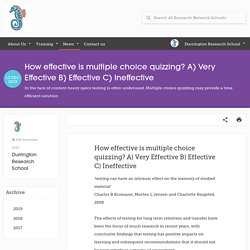
Memories are made of this. Look at the following characters for as long as you like and then try to copy them onto a piece of paper without looking back at them. Most people can’t do it. In fact, most people in Britain would probably need to copy it one character at a time and maybe even one stroke at a time. You might then need to look back at it a dozen times to be sure you had it right.
The Science of Early Learning. “Ask the Cognitive Scientist” Columns Highlighting Empirical Generalizations and Their Applications. Do Students Utilize Effective Learning Strategies? My anecdotes with my students are not unique. Many students are unaware of the best ways to study, and instead rely on their own intuition about what works (see this blog to read about the problem with using intuition). We can't just rely on anecdotes to determine the state of affairs, however. We know students don't utilize effective study strategies as often as ineffective ones because of systematic studies investigating college students' use of various study strategies. How should students revise? A brief guide. One of the biggest lessons from research is that many students don’t really know how to study. Various studies have shown that students rate re-reading and highlighting as the most effective ways of revising when in reality they are often a waste of time giving an illusion of competence in the short term at the expense of long term gains.
Students may spend large amounts of additional time studying despite no gain in later memory for the items, a phenomenon called ‘‘labour-in-vain’’ during learning (Nelson & Leonesio,1988). Recent research with educationally relevant materials has shown that repeatedly reading prose passages produces limited benefits beyond a single reading. (Karpicke, Roediger, Butler, 2009) What do we mean by 'knowledge rich' anyway? Recently, I published a blog on the EEF website on a ‘knowledge rich’ curriculum – you can find it here. I have republished it on my website for regular readers. A New Year’s Prediction: 2019 will be The Year of Curriculum.
Applying the science of learning in the classroom. Retrieval and Spaced Practice. Why do we forget stuff? Familiarity vs recall. Now and then, I’ve taught whet seemed to be a successful lesson. I’d explain challenging content, check for understanding, get some great responses to consolidation activities and, at the end of the lesson, students would troop out happy, confident and certain they’d grasped what ever it was I’d taught only for them to have seemingly forgotten it all by next lesson. Sound familiar? How is it that children can appear to have understood one day but forget the next?
In order to remember something, first you have to think about it. We can’t think about everything in the environment because we have a limited capacity to pay attention, but anything we think about is stored in long-term memory. The role of forgetting as we learn - Institute for Teaching. Nick Rose, Curriculum Design Lead at the Institute for Teaching. Impact! Superb College of Teachers journal made me think – a lot! 15 myths about memory and learning.
Useful Links. Bridging Cognitive Science and the Classroom Sites and Blogs: The Learning Scientists - a site and blog by cognitive psychologists who work to improve education by advocating science-based learning strategies. Analysis: For Ed Tech That Actually Works, Embrace the Science of Learning. How to Memorize Fast and Easily. What every teacher should know about ... memory. There is a wealth of psychology research that can help teachers to improve how they work with students – but academic studies of this kind aren’t always easy to access, or to translate into the realities of classroom practice. This series seeks to redress that, by taking a selection of studies and making sense of the important information for teachers. The Learning Scientists. Frequently Asked Questions. TREE Individual Lessons. Daretodifferentiate - home.
Questioning and Feedback: Top Ten Strategies. SAGE Journals: Your gateway to world-class journal research. "There is nothing either good or bad, but thinking makes it so." The 7 habits of highly effective lesson plans – Peps Mccrea – Medium. Every year for the last six years, I’ve worked with over 50 teachers to help them become outstanding planners and teachers. Cognitive Load Theory, chapters 9 & 10 - TeachingHOW2s. Dispelling Educational Myths - Science of Learning Research Centre. Principles of Instruction Barak Rosenshine Ink lite. 1144 1. Memory and the primary mathematics classroom. – The Golden Spiral. 5 Important Things Educational Research has Taught Me – perspectED. Dylan Wiliam memories 20170825213033. A longer piece on the taxonomy of Bloom. Krathwohl. A summary of my arguments about education. SAGE Journals: Your gateway to world-class journal research.
Four ways cognitive load theory has changed my teaching A quick introduction to the education debate – Filling the pail. Organizing Instruction and Study to Improve Student Learning. Deliberately difficult – why it’s better to make learning harder. Spacing, Interleaving, the Testing Effect and Distributed Practice (the Diet Coke version) Love Learning Ideas. Creating a culture of Critique. Ten teaching techniques to practise – deliberately. Retrieval Practice: A Teachers' Definition and Video Examples.
Rosenshine. Primarytimerydotcom – primerytimer. Thought Depends on Knowledge – 3-Star learning experiences. Why you should forget plenaries and embrace the ‘memory platform’ Don’t forget that we’ve all got a limited memory. Total recall: helping students retrieve content. Weekly Digest #88: Psychological Misconceptions in Movies and TV shows. How can interleaving help students to retain knowledge? - The Chartered College of Teaching. Spacing and Interleaving.